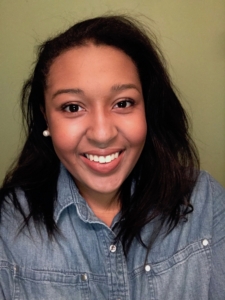Health Well Fit
I’ve only worked out in three non-grade-school gyms in my life. On a recent October morning, I walked into a fourth, sure I wanted to give capital-F Fitness another try. By then, I was already familiar with the standard gym setup: cavernous mostly-male dungeons lined with mirrored walls and hedged with free-weight shelving that surrounded a lush field of treadmills, ellipticals, and stationary bikes, like orchard trees parked and planted in neat rows.
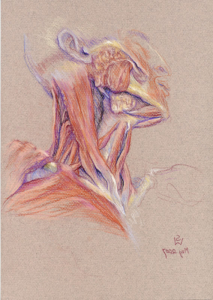
Chin up! / Neck and lower jaw (right side): muscles, glands, inferior view
The trouble is that my relationship with the idea of Fitness has always been deeply conflicted. When I imagine myself, I imagine a thin, short girl trapped inside the body of a tall, curvy one. Thus, my body is a familiar, if uncomfortable place. Beauty standards would have me believe that my body fat mitigates my beauty, that it keeps me near the midpoint between invisibility and allure. But I wear my body fat like armor.
It functions as a cage and a fortress. It is the impenetrable bastion that has shielded me from the fallout of life and love. But it also seems to offer me more space and more protection than I truly need. The forces that have motivated me to better understand and work toward fitness were also forces that occluded my progress, perhaps because the pursuit of Fitness has always promised me threat and salvation—the freedom of a smaller body at the cost of the larger one I’ve always called home.
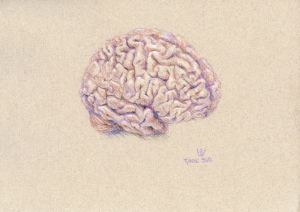
Brain (right): cerebral cortex and cerebellum by Susan Dorothea White
Becoming paralyzed amid the throes of this inner struggle had always defeated me before. I wasn’t sure my next Fitness attempt would be much different. I was already familiar with the standard workout routine. The slog of going machine to machine, examining instructional illustrations, and giving the workout my best shot—a routine which left me with sore muscles, fluctuating eating habits and bitten-back shame, while comparing myself to the other gym-goers, who looked more like fitness gurus than everyday people. It was hard to be optimistic.
Until I met Luke Griffin.
The Atlanta-based athlete, trainer, and body-builder comes down the cardio machine aisle. He’s almost a head taller than me, though I don’t realize it at first, as I power walk on the elevated treadmill. Today, on Day 2 at the new gym, we are scheduled for a kick-off session: an hour long one-on-one beginner’s class with a personal trainer. It’s a perk for new gym members like me. I’ve never worked with a personal trainer before, and honestly, I’m feeling unenthusiastic.
I’ve seen trainers around gyms in the past, usually in some shade of lean, muscular, and picturesque. I assumed personal trainers came in a standard issue, a classic tormenting or motivational mind trip. I also assumed that the last person I might want to see when I was sweaty and ashamed at the state of my fitness level was some glowing, superhero-shaped muse of a marble statue. But Luke isn’t like the trainers I’d observed in the past.
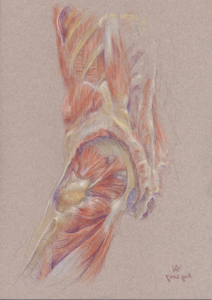
Deep Hip Muscles / Hip (left), lateral view, deep muscles (gluteus maximus removed) by Susan Dorothea White
Luke has a regular dude’s face, seated on a linebacker’s neck and shoulders, resting on an Olympian’s legs. His body is big enough to completely obscure my view of the gym behind him. He’s easy-going, genuine, and knowledgable. His not-out-of-a-can personality is comforting and almost makes me forget that he’s about to lead me through a workout that will likely put me in my grave. I’m distracted from this reality when he begins to educate me about health, wellness, and my body in a way I’ve never experienced before.
Beyond working out the meaning of Fitness in my life, my struggle with the concept has also been stoked my lack of knowledge about the way my body works with itself and other agents that contribute to health and wellness, like nutrition, sleep, and stress. I didn’t know much about Fitness because in three elementary, one middle, four high school and five college settings, no one ever taught me about it.
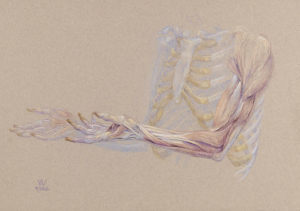
Anatomy of Gestures in The Last Supper: Simon’s Hands by Susan Dorothea White
Luke instructs me to do a special sort of squat, from which he will assess the way my bones and musculature are working for and against me. I am certain that I could have lived out the rest of my life and died without discovering any of the insights that come to him within ten seconds of my first squat. Of my neck and shoulders, he identifies a particular muscle on my left side that’s always on and over-engaging, which causes my shoulders to slump forward, straining the muscles in my neck: “Which will lead to intense migraines,” he notes.
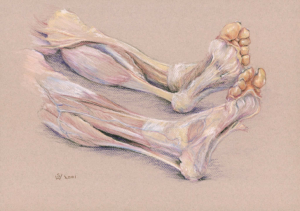
Dissected Legs / Legs and feet: muscles, fascia, Achilles tendons, 2001 pastel and conté by Susan Dorothea White
I’ve never had migraines before, but for my mother they are a frequent enemy. I see her achy head as a glimpse of my future. “Your feet pronate,” Luke informs me. I know this about my feet. What I don’t know, as he goes on to explain, is that the curvature of my feet and stance cause my knees to bend in dangerous directions. Because my body has tried to compensate for this all my life, my pelvis is crooked. Here is information about me that I would not have discovered without the standard procedure of one gym and a chance pairing with Luke.
Debunking the mysteries of my body, the ones I’ve never been able to identify, let alone solve, is the first step toward our working relationship. After only one session, I am sure that Luke has the power to forever change my relationship with my body for the better. Here is information specific to me that greatly influence the ways I should be eating and working out.
Luckily, none of the information Luke provided seems life-threatening. Or is it?
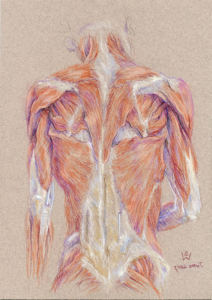
Back Muscles and Shiny Mirror Tendons / Back, neck and shoulder muscles, fascia by Susan Dorothea White
No doctor had ever mentioned any of Luke’s observations about the workings of my body to me. If they’d ever noticed my crooked pelvis or overactive neck muscles, they’d never let on, which I find at best, fascinating. At worst, infuriating. In all the well-meant suggestions from doctors to watch my weight or exercise and eat well, not one had ever offered tangible guidance or advisories about the complexities of my personal anatomy. None had noticed or mentioned that I might find certain aspects of my muscular upkeep challenging based on the natural tendencies of my posture and presentation.
But isn’t it the job of a doctor to inform patients about the workings of their body? To set them up for physical and psychological success? Luke’s findings mean that there are steps I can take to correct my altered posture and soothe my most affected and strained muscles. His approach calls to light an age-old debate about the world of medicine: Is medicine best utilized preventatively or prescriptively? Perhaps a doctor would not have taken notice of Luke’s observations about me until I arrived in their office, old, hunched, and ailing from lifelong muscular and posture problems.
Luke takes me through a number of exercises, only one of which I am truly familiar with: the lat pulldown, a bench and metal bar meant to work out the biceps and lower back, or so I’d thought. When I’d encountered this machine before, I glanced at the introduction illustration, got into position, and pulled down. Overtime, I upped the weight limit. I felt my muscles working. That’s all there is to it, right?
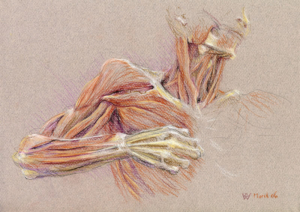
Drawing the Bow / Muscle Action of an Archer (anterior view) by Susan Dorothea White
When Luke sits me down, he adjusts me into the correct position. I am supposed to hold my torso at an 120 degree angle, not 90 (as the picture suggests). My hands are supposed to hold the bar near the outer edges. I am supposed to suck my bellybutton in, engage my core, and pull the bar to my collarbone in front of my face. With every pull, my shoulders are to gather together at the center of my back, perfecting the contraction. Exhale on the pull, inhale on the release.
I sit on the bench, breathing hard in between reps, realizing how much time I’ve wasted at the gym in the past. I’ve likely never done a proper rep on any machine in my life. Most probably, my core only has the strength it was born with. And I certainly can’t name any of the muscles my body truly needed to work: the miniature muscles supporting the big guys, the ones that were hard as asphalt from being neglected for so long.
But soon the frustration congeals around my ignorance and starts to melt, giving way to hope. An education about my body and the proper care of it—one I’ve always wanted and never known how to access—has suddenly appeared before me in the shape of a big-hearted personal trainer. Over the crest of the hill, I can see all that is possible if I can harness my newfound hope and let learning lead me through the fog. It is empowering to feel, for the first time in my life, that my relationship to the concepts of health, wellness, and even capital-F Fitness is, in fact, mine—one that holds as much promise and possibility as I dare to put into it.
Regan Humphrey is an award-winning writer and MFA candidate at Antioch University Los Angeles, studying Young Adult Fiction. She is a writing mentor, film-enthusiast, music-buff, and longtime performer. She holds degrees in Marriage & Family Therapy, Cross-Cultural Relations, and Creative Arts, Writing & Performance.
Artwork: © Susan Dorothea White

